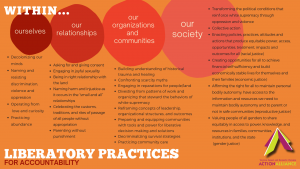Resources Library: Healthcare Professionals
Start a Search:
LGBTQ Survivor Handbook
This booklet was created by the Virginia Anti-Violence Project and is designed to help LGBTQ people who are experiencing/have experienced violence in their lives and/or their support people to better understand what is happening and how it impacts LGBTQ people. This booklet also offers resources and options for survivors.
Liberatory Practices for Accountability Across the Social Ecological Model

What does accountability look like without punishment, isolation, and shaming?
What are the shifts we can make in ourselves, our relationships, communities, and as a society to move from punishment to true accountability, which builds connection and encourages growth?
This infographic, created for the Action Alliance webinar series, “Reimagining Our Legacy: Transforming from Criminalization to Liberation”, seeks to offer a few ways in which we can practice methods of accountability that liberate us from punishment and harm and move us toward healing and connection.
Maternal Mortality Review – Each Death Matters
Virginia’s multidisciplinary Maternal Mortality Review Team reviewed nearly 400 cases of pregnancy-associated death occurring between 1999 and 2007. This brief article was published by the National Women's Health Network and authored by Victoria M. Kavanaugh, RN, PhD, Maternal Mortality Review Team Coordinator with the Virginia Department of Health, Office of the Chief Medical Examiner. In the article, Dr. Kavanaugh summaries Virginia data and emphasizes the need for maternal mortality reviews as a means to develop recommendations for interventions and prevention strategies to prevent future deaths. These recommendations apply to a wide array of fields, including prenatal health care, social work, psychiatry, emergency care, dietary services, health care, and advocacy.
Mistreatment of Marginalized Elders
The National Center on Elder Abuse (NCEA) has developed Research Briefs to help practitioners, students, and researchers access recent and past research studies and highlights of findings on how elder abuse impacts various marginalized communities. View each research brief below for more insight into these areas, and ways to combat this complex experience of violence.
Power and Control Wheel: Abuse in Later Life
The Power and Control Wheel is a tool that helps explain the different ways an abusive partner can use power and control to manipulate a relationship. During 2005, NCALL staff asked facilitators of older abused women’s support groups to have participants review the Duluth Domestic Abuse Intervention Project’s Power and Control Wheel. Over 50 survivors from eight states responded. NCALL created this Abuse in Later Life Wheel from their input.
In addition to the tactics on the wheel, many offenders justify or minimize the abuse and deny that they are abusive. Perpetrators of abuse in later life may make comments like “she’s just too difficult to care for” or “he abused me as a child” to blame the victim, or try to minimize the abuse by stating the victim bruises easily or injuries are the incidental result of providing care.

